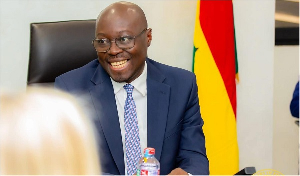In 1877 after the second Anglo-Asante war, Accra replaced Cape Coast as the capital of British Gold Coast Colony because Accra had a drier climate relative to Cape Coast and even more important, Accra was not home to the tsetse fly hence conducive to animal transportation which was the order of the day. The development of Accra and Ghana took a gratefully positive turn when in 1919, Sir Fredrick Gordon Guggisburg, a surveyor, a soldier and administrator was appointed governor and Commander-in-chief of the Gold Coast. In pursuance of his policy of “development of the country by and for the natives rather than for the benefit of the Colonial Empire” he introduced drastic reforms and devoted himself energetically to the task of developing Gold Coast for its people.
In Accra he created forest reserves to prevent soil erosion and improved the system of drainage. Under the direction and planning of Governor Guggisburg people started referring to Gold Coast as a model colony and Accra became the most prosperous and hospitable colonial city in Africa, with well-planned and clean streets, forest reserves and parks; commercial centers; schools and railway from Accra to Kumasi.
When Ghana became independent in 1957, Accra still held the promise of a clean, vibrant and growing city with adequate schools, parks, water, regular supply of electricity and social amenities. President Nkrumah and his team ensured that Accra continued to be clean with well planned sewage system. Law and Order was also maintained and Landlords did not and could not extend or redesign their structures without approval from the relevant authority.
Presently, nobody beside the government would want to pretend that Accra with its daily congestion, filthy and unhealthy environment, hold the same prospects for the future. Accra at the moment is just over-crowded to the point of chocking and decency and common sense is out of the equation. There is acute shortage of water, electricity, schools and all facilities and amenities. The traffic is a nightmare and pedestrian or bicycle pathways are no where available. Wheel-chair access is a rear sight. The indiscriminate disposal of refuse which has resulted in the choking of drains and gutters is a symptom of the problem of Accra crying out loud for attention. You would have thought that the regularity of the flooding problems in Accra was enough to draw the government’s attention to the problem, but somehow most of the post independence Ghanaian politicians have come to believe that if you keep on throwing money at a problem it will surely vanish.
The problems of Accra will however not go away until we tackle them with proper project management which involves planning and monitoring. This is one of the most important challenges of our time, because in Ghana, Accra the principal city associated with the country’s seat of government is the center of political power (legislative, administrative, judicial, and economic center). Everything starts, takes shape and ends in Accra, a situation that no forward looking nation would tolerate in this fast-paced world economy. One obvious major problem is the unprecedented congestion in Accra which slows down every transaction for everybody and the nation as well, due to loss of hundreds of man-hours everyday in traffic. As a result any transaction that should take a day to accomplish takes at least 3 days.
A solution is to create another capital as administrative capital to eliminate delays and enhance efficiency in government operation. This will not only expedite the function of government, but will start the decongestion of Accra which is the basic problem with the city. The flooding is just a symptom and unless we decongest Accra first, all the money we spend on the symptoms will continue to go into waste.
The idea of multiple capitals is not only common. It has become the most viable option for a lot of forward-looking nations whose original capitals were not well chosen or planned to accommodate the modern demands of a strategic National Capital. Even in the neighborhood, Ivory Coast moved its administrative capital from Abidjan to Yamoussoukro in 1983. This made the official capital Yamoussoukro but many government offices and embassies remain in Abidjan. Everybody is aware of Nigeria replacing Lagos with Abuja as the official capital while keeping some administrative offices still in Lagos. Porto-Novo is the official capital of Benin but Cotonou is the seat of government. Israel has proclaimed Jerusalem as its political capital yet most of the embassies and national security offices are still in Tel Aviv-Jaffa, which was Israel’s capital from 1948 to 1950. Malaysia, Myanmar, Netherlands, Sri Lanka, Swaziland and Tanzania just to mention a few, have all found it practicable if not sensible to have more than one capital. South Africa the only African nation considered as industrial, has three capitals. Pretoria is the administrative capital, Cape Town is the legislative capital, and Bloemfontein is the home of the judiciary. A new better planned administrative capital befitting the status of Ghana will eliminate the congestion (traffic, human, schools, housing etc). All the Ministries and most of the government departments will move out for resettlement.
A lot of people do not want to talk about the possibility of another capital for they automatically assume that we can’t afford it. But it will be cheaper for us as a nation to build a new capital than to continue on the track we are on. With good project planning monitoring and accountability, another capital will save the nation more than we shall lose in our current situation if we do not change drastically our modus operandi.
During the last flooding in Accra the Government allocated more than $25 million to combat the flooding in some parts of Accra. I am going to resist the temptation to comment on this but just to say that $25 million is sufficient for any government with integrity and humility to cover the feasibility studies and planning for a modern city. Rumors have it that Nigeria spent more than 3 times the actual cost of building Abuja because they wanted an express project.
We do not need a fully completed new capital up and running within five years, it can be carefully integrated into our national planning. The emphasis is on the planning, as Governor Guggisburg and Nkrumah nurtured the infancy of Accra, before lawlessness and illegal structures, open gutters and rampant disposal of trash, misappropriation of government lands and forest reserves became a common feature on the city.
The last Auditor-General’s report of 2009 mentioned that as a result of lack of accountability and criminal conduct of government officials and their collaborators, the nation lost more than GHc 2.5 billion through financial malfeasance, and this has been a yearly occurrence for the past 20 something years; so if the government enforces integrity and accountability and we are also able to expedite government action through the elimination of bottle necks why can’t we as a nation increase our national income.?
I shall even venture to suggest that the government considers the northern part of Brong Ahafo region, between Kintampo and the black Volta for the location of the second capital, for the fact that it is more central, and there appear to be land and water available. I however know there are other good locations. My hope is that if such a decision would be made it would be based on strategic and economic reasons and factors but never on political considerations.
Finally I watched the tragedy in Haiti last year when the earth quake devastated that poor country. As it has been confirmed, the sad response of the Haitian government was because the quake hit Port-au-Prince, the capital city and devastated the parliament building along with a lot of government buildings. Since they operate a system very much like ours where everything is initiated from the capital, nobody knew what to do without direct instructions from Port-au-Prince. We should not loose sight of the fact that Accra is an earthquake prone area. This is a wake-up call. A word to the wise is enough.
By Joseph Andorful
Email: kwesitawia@verizon.net
Opinions of Friday, 25 February 2011
Columnist: Andorful, Joseph
Ghana: The Need for another Capital
Entertainment













